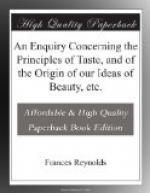The second is in the immediate external effects of true taste, or moral virtue, in the social sphere; the order, beauty, and honour, which every object derives from its influence; and, of course, its sentiment must be intimately related to moral excellence.
The third and last degree is general ornament and honour, appearing in fashions, arts of decoration, &c. &c. objects which seeming not immediately to affect the interests of humanity, the taste they exhibit in this sphere appears as an uncertain light, sometimes bright and sometimes obscured; or rather as refracted rays of taste, broken by the general love of novelty and superfluity; two principles which, though they are, to a certain degree, essential to exterior ornament, and the sentiment of true taste, are those in which taste always begins to corrupt. To illustrate my meaning: true ornament seems equally to partake of the idea of utility and superfluity, and every sentiment of taste seems equally to partake of the idea of novelty and of custom; for, were the object perfectly familiar to us, we should feel no degree of admiration, without which we could feel no sentiment of taste; and, were it totally new, unlike any thing we had ever seen, it would excite wonder instead of admiration, which is a sentiment as distant from taste as the love of fame is from the love of honour.
This sphere, the last in my scale of the perceptions of taste, and which borders upon every thing that is contrary to its laws, is properly the sphere of Fancy, who seems an undisciplined offspring of Taste; sometimes sporting within the bounds of parental authority, and sometimes beyond them. Fancy seems to bear the same affinity to Taste as Pleasure does to Happiness.
Every object of taste is relative to some principle of excellence from which it derives its power of pleasing; of course, the highest sentiment of taste must exist in the relative principle to our highest object of excellence.
True ornament is, to the eye, what eloquence is to the ear: their principles throughout are one, the truth or beauty of which exists in its exact relation or adaptation to the object it adorns, constituting the just, the true, the beautiful, objects, or qualities, which, in the conscious eye of taste, relate to moral beauty. The perception of the first relation, i.e. the adaptation of any thing ornamental to the object it adorns, may, in a great measure, be learned by habit and general observation; but the higher relation, the second concoction (as one may say) of its principles, the moral relation, is the immediate operation of taste.
Ornament and harmonious sound are pleasing to the corporeal sense, but, when wanting a relative object, please but for a short time; and, if incongruously joined to an object, i.e. to one with which it can have no relation, will, as soon as the understanding perceives the incongruity, become a principle of disgust.




